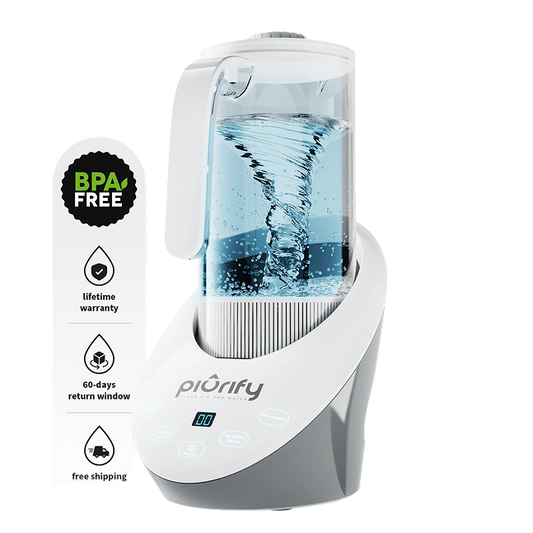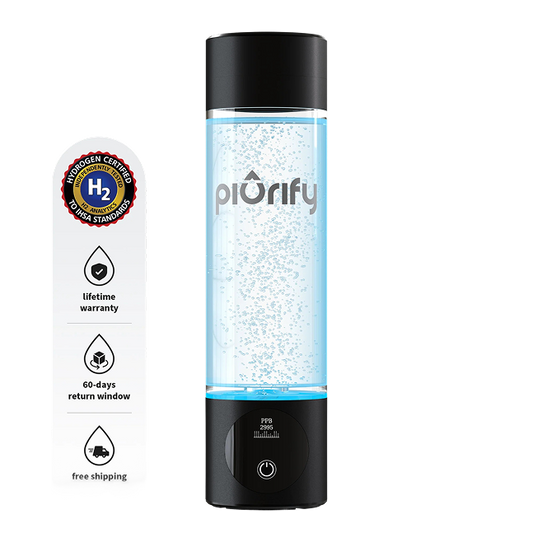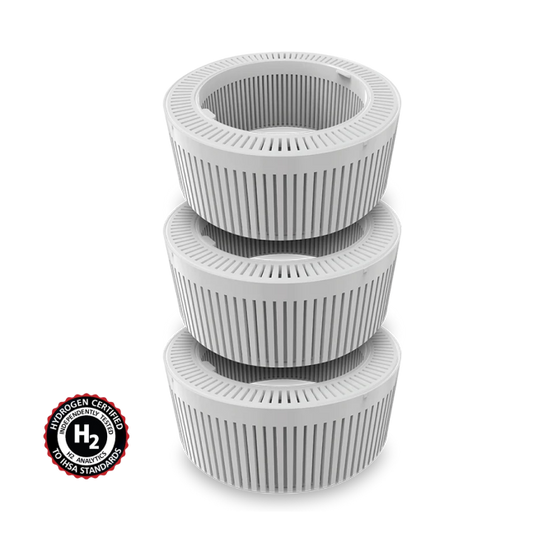Hydrogen Tablets vs Hydrogen Water Bottles: Which One is Best?
Are you considering adding hydrogen water to your daily routine? If so, you’re probably wondering which is better: hydrogen tablets or hydrogen water bottles. Both have their own pros, cons, and differences, but which is best for you?
Let us help you decide. In this guide, we break down how each method works, compare their pros and cons, and help you decide which is right for your needs.
What is Hydrogen Water?
Hydrogen water is water that has been infused with molecular hydrogen gas (H₂). Unlike regular water, which is made up of H₂O molecules but contains very little free hydrogen gas, hydrogen water has added dissolved hydrogen molecules that can be beneficial to your health.
Molecular hydrogen is a potent antioxidant. Studies suggest that it can neutralise harmful free radicals that contribute to inflammation and oxidative stress (key factors in aging and many chronic diseases).
Some more potential benefits of hydrogen water include:
- Reduces inflammation
- Supports brain and heart health
- Better hydration
- Improved energy and recovery
- Promotes cellular energy production
However, people react to hydrogen water differently. Some may notice all the benefits, and others may experience none. Some may also experience side effects of hydrogen water such as an upset stomach.
You can learn more in our detailed guide to hydrogen water.
What Are Hydrogen Water Tablets?
Hydrogen tablets are compact, dissolvable tablets that generate hydrogen when you drop them in water. They offer a quick and convenient way to create hydrogen-rich water wherever you are – all you need is a glass of water.
How Hydrogen Tablets Work
Hydrogen tablets usually contain a magnesium-based formula. When you place a tablet in water, it creates a chemical reaction between magnesium and water, which then releases molecular hydrogen (H₂) into the liquid. You'll probably notice fizzing or bubbling as the gas forms and then dissolves.
For best results, add your tablets to a sealed or covered container. This will prevent hydrogen loss. Give your tablets about 5–10 minutes to dissolve, and then drink your water shortly after preparation, as hydrogen gas can escape quite quickly.
Benefits of Hydrogen Tablets
- High hydrogen concentration per serving
- Portable and travel-friendly
- Fast acting – ready in 5–10 minutes
- You don’t need electricity or devices
- More affordable upfront than buying a hydrogen water bottle
Cons of Hydrogen Tablets
- Ongoing cost of refills
- Have to use them correctly to ensure proper hydrogen levels
- Inconsistent hydrogen concentration
- Metallic or unpleasant taste
- Potential digestive discomfort
- Lack of quality control
What Are Hydrogen Water Bottles?
A hydrogen water bottle is a reusable bottle that uses electrolysis technology to infuse hydrogen gas into your regular drinking water.
Hydrogen water bottles can look like regular water bottles – however, they include a built-in electrolysis chamber at the base, powered by a rechargeable battery.
How Hydrogen Water Bottles Work
Hydrogen water bottles use a small electric current to split water molecules (H₂O) into hydrogen (H₂) and oxygen (O₂). This process begins when you fill the bottle with water and then activate the electrolysis function.
The hydrogen then dissolves into the water as the oxygen gets released through a vent. Our hydrogen bottles at Piurify also expel byproducts such as ozone, chlorine and hydrogen peroxide from drinking water.
Key Benefits of Hydrogen Water Bottles
- Eco-friendly and reusable
- Convenient for daily, long-term use
- One-time investment (no tablet refills)
- More affordable in the long run
- Can customise hydrogen levels on some models
- Unlike tablets, hydrogen bottles allow gradual consumption over a few hours
Cons of Hydrogen Water Bottles
- Higher upfront investment
- Requires charging
- Takes longer to infuse hydrogen than tablets
Hydrogen Water Tablets vs Bottles: A Quick Comparison
| Feature | Hydrogen Tablets | Hydrogen Water Bottle |
|---|---|---|
| Hydrogen Concentration | Can be high, but often inconsistent | Stable and consistent (varies by model) |
| Portability | Extremely portable | Portable, but bulkier |
| Ease of Use | Drop into water, wait, drink | Fill, press a button, wait |
| Time to Infuse | ~5–10 minutes | ~5–20 minutes |
| Upfront Cost | Low | Higher initial cost, but a cost-friendly investment |
| Ongoing Cost | Medium-high (regular tablet refills) | Low (minimal electricity usage) |
| Eco-Friendliness | Depends on the packaging and disposal | More sustainable over time |
| Power Source Required | No | Yes (rechargeable battery) |
| Customisable Settings | No | Yes (on many models) |
| Health Considerations | Magnesium-based: not suitable for everyone (can interact with some medications) | Safe for regular use with no known medication interactions |
| Additives | Often contain binders or flavouring agents | No additives, just water and hydrogen |
| Storage Stability | Sensitive to heat, moisture and delivery conditions | Long-lasting with proper care |
| Quality Control | Varies by brand - hard to verify purity | Certified, tested technology (varies by model) |
Which is More Affordable?
Hydrogen tablets are a recurring expense, whereas hydrogen water bottles are a one-time investment. Let's break this down a bit further.
Hydrogen tablets are cheaper upfront. They typically cost around $1 to $2 per tablet, so if you drink one a day, then you could be spending $30 to $60 per month.
Hydrogen water bottles, however, can cost anything from $100 to over $300 upfront, depending on the brand, features, quality and technology used. The only ongoing cost is electricity for charging, which is minimal.
If you want to drink hydrogen water every day for a year, here’s what you can expect to pay for each method:
-
Hydrogen water tablets:
Around $1.25 per tablet x 365 = $456 -
Hydrogen water bottle:
A one-time cost of around $200 with a maximum of $10 for electricity cost = $210
Hydrogen water bottles are the more affordable option in the long term, and can last for years when cared for.
Do You Need to Add Hydrogen Tablets to Hydrogen Water Bottles?
No, you don't need to add hydrogen tablets to your hydrogen water bottle. We don't recommend doing this as it may interfere with how your water bottle functions.
It can affect the electrolysis function of the bottle and cause excessive gas buildup. Hydrogen tablets and hydrogen water bottles are two separate and complete methods for producing hydrogen-rich water.
How Important is the Delivery Method?
Yes, the delivery method does make a difference. Both give you hydrogen-rich water, but the delivery method affects the hydrogen concentration levels. Your choice of delivery also impacts cost, convenience and the environment.
Hydrogen tablets tend to produce higher concentrations of dissolved hydrogen compared to most consumer-grade hydrogen water bottles. That’s because the reaction between magnesium and water in tablets can create supersaturated hydrogen levels.
However, the PIURIFY Hydrogenator® Bottle offers a hydrogen concentration of over 4000 PPB and retains hydrogen for up to 4 hours.
To learn more about the ideal hydrogen concentration for maximum benefits, check out our guide on the best PPM for hydrogen water.
Which Option Is Best for You?
The choice of hydrogen tablets vs hydrogen bottle depends entirely on your lifestyle and personal preferences. Both have their own benefits, but the right choice depends on how you plan to use hydrogen water day-to-day.
Hydrogen tablets might be the best option for you if you:
- You travel frequently or lead a fast-paced lifestyle
- You want maximum hydrogen concentration
- You’re not ready to invest in a hydrogen water bottle
Whereas a hydrogen bottle might suit you best if you:
- You want a more sustainable and eco-friendly option
- You mostly drink hydrogen water at home or at work
- You want more control over your hydrogen intake
- You don't mind paying upfront to lower the long-term costs
Some people even choose both – using tablets while travelling and a bottle at home. It’s not one-size-fits-all, and your ideal setup may evolve over time.
Looking to experience the benefits of hydrogen water? We've got you covered. Explore our range of hydrogen water products today.


